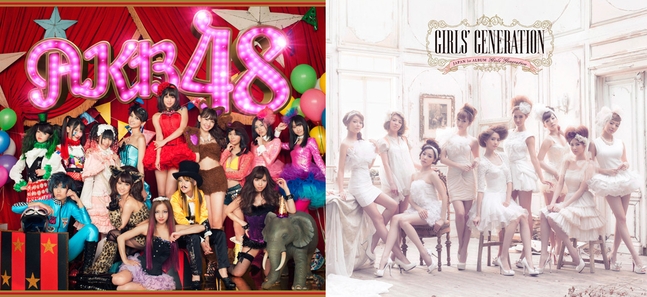AKB48, 'Koko ni Ita Koto'/Girls' Generation, 'Girls' Generation'
You might not hear a better J-pop album this year. Or a worse one

Posted: Wed Jun 15 2011
Simon Cowell? That perma-tanned lunk doesn't have a thing on Yasushi Akimoto. Consider, if you will, what the J-pop Svengali has achieved over the past few years with AKB48 and their ever-growing army of sister squadrons. Koko ni Ita Koto went on sale just a day before the results of the group's annual elections were announced – the culmination of a campaign that drew lavish coverage in normally sober-minded newspapers such as the Asahi Shimbun. You had to buy their latest single to vote, of course, which might explain how 'Everyday, Kachuusha' managed to sell over 1.3 million copies in its first week on sale.
That's a staggering amount – all the more so when you consider that the previous top 5 first-week sales records were all set in the '90s. As the global music industry wheezes and flails for life, Akimoto hasn't just convinced the fans of his creations to buy CDs: he's made them willing to do it on a truly lunatic scale. After reports circulated about one diehard bulk-ordering 5,500 copies of 'Everday, Kachuusha', NTV's Shirisugi program dug up a paunchy video store manager who'd spent a total of ¥20 million on his AKB48 habit. 'Does your mother know about this?' asked one of the presenters, gazing at the boxes of unopened CDs cluttering his apartment. It seemed like a reasonable question to be asking.
What doesn't get asked so often is why middle-aged men are so devoted to such wrenchingly awful music. Listening to Koko ni Ita Koto in one sitting – and, at nearly 70 minutes, there's a lot of it – is a real challenge, comparable perhaps to hearing Alvin and the Chipmunks play Stevie Wonder's 'Happy Birthday' on repeat for an equivalent length of time while being force-fed candy floss until your stomach splits open. It's not too hard to imagine a song like 'Boku ni Dekiru Koto' landing in the lap of a Johnny's group, but the hyper-jaunty 'Renai Circus' and 'Wagamama Collection' are more representative of the whole. It's J-pop that's been infantilised, reduced to the level of kindergarten songs. That half of the tracks are wedded to the same pachinko four-four beat serves merely to make it all the more deadening.
Of course, AKB48 aren't Akimoto's first mass girl group with a revolving-door membership policy. He was also responsible for Onyanko Club, a vast collective of high schoolers who scored a string of hits in the mid-'80s. The key difference between then and now was in the lyrics: Onyanko's debut single carried the improbable title 'Don't Make Me Take Off My Sailor Suit', and contained couplets like 'I am a little scared / But it's boring being a virgin.' In comparison, AKB48 rely on bland exhortations – don't give up your dreams ('Chance no Junban'), always do your best ('Overtake') – and equally bland expressions of affection ('I want you / I need you / I love you' in 'Heavy Rotation'). Perhaps the target audience has regressed so much that any overt display of sexuality would be deemed too threatening. Whatever: in its unswerving, plastic exuberance, Koko ni Ita Koto is like a Mass Games performance without the artistry.
It'll sell by the truckload, of course, and also eclipse the J-pop album debut of AKB48's Korean rivals. Girls' Generation, which came out on June 1, isn't a terribly adventurous record: the majority was penned by the same international songwriting teams who keep western pop stars stoked with hits, and the group themselves bring so little personality to the table that it feels as if anyone could have sung it. Earlier K-pop hits including 'Genie' and 'Run Devil Run' are reprised in Japanese, although they're paler versions; never mind the obvious awkwardness of singing in a second language – the mastering lacks the heavily compressed punch of the originals, and they sound a little weedy in comparison.
In other respects, though, Girls' Generation can be considered an improvement on its K-pop predecessors. As surprising as this might sound for a pop record being released in 2011, it's actually a cohesive album. While the group's last Korean full-length, Oh!, started strong but got mired in indifferent balladry, there's very little flab here, and the album tracks – especially 'You-aholic', 'Let It Rain' and 'The Great Escape' – hold their own alongside the singles. Most of the songs stick to an au courant palate of Eurodance synths, processed vocals and club-friendly thump, meaning that when 'Gee' – the Korean version of which was released back at the beginning of 2009 – crops up late in the day, it feels rather out of place. Sure, closing number 'Born to be a Lady' is rubbish, but it's also the last track – skip it.
While AKB48 have released what might be this year's worst J-pop record, it's taken a group nurtured over in South Korea to produce one of the best. This might have been a wake-up call to an increasingly solipsistic pop industry, but Akimoto's prodigious sales feats will probably speak louder, leading others to attempt to engineer a similarly gullible and cult-like fanbase. Still, there's only one album here that you'll still be listening to at the end of the year, and it starts with a G.
Time Out rating:
 (Koko ni Ita Koto)
(Koko ni Ita Koto)
 (Girls' Generation)
(Girls' Generation)
Tweets
- About Us |
- Work for Time Out |
- Send us info |
- Advertising |
- Mobile edition |
- Terms & Conditions |
- Privacy policy |
- Contact Us
Copyright © 2014 Time Out Tokyo














Add your comment